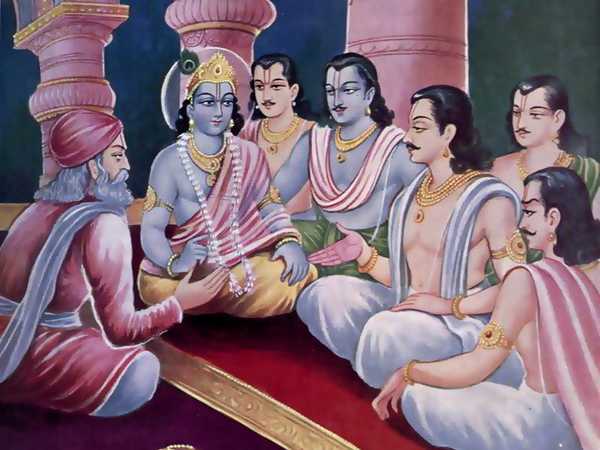Chapter 21

“Dhritarashtra said, ‘When Pandya had been slain and when that foremostof heroes, viz., Karna was employed in routing and destroying the foe,what, O Sanjaya, did Arjuna do in battle? That son of Pandu is a hero,endued with great might, attentive to his duties, and a complete masterof the science of arms. The high-souled Sankara himself hath made himinvincible among all creatures. My greatest fears proceed from thatDhananjaya, that slayer of foes. Tell me, O Sanjaya, all that Parthaachieved there on that occasion.’
“Sanjaya said, ‘After Pandya’s fall, Krishna quickly said unto Arjunathese beneficial words, “I do not behold the King. The other Pandavasalso have retreated. If the Parthas had returned, the vast force of theenemy would have been broken. In fulfilment of purposes entertained byAshvatthama, Karna is slaying the Srinjayas. A great carnage is beingmade (by that warrior) of steeds and car-warriors and elephants.” Thusthe heroic Vasudeva represented everything unto the diadem-decked(Arjuna). Hearing of and beholding that great danger of his brother(Yudhishthira), Partha quickly addressed Krishna, saying, “Urge thesteeds, O Hrishikesha.” Then Hrishikesha proceeded on that irresistiblecar. The encounter then that once more took place became exceedinglyfierce. The Kurus and the Pandavas once more fearlessly closed with eachother, that is, the Parthas headed by Bhimasena and ourselves headed bythe Suta’s son. Then, O best of kings, there once more commenced a battlebetween Karna and the Pandavas that swelled the population of Yama’skingdom. With bows and arrows and spiked clubs and swords and lances andaxes and short clubs and Bhushundis and darts and rapiers and battle-axesand maces and spears and polished Kuntas, and short shafts and hooks, thecombatants quickly fell upon one another, desirous of taking oneanother’s life. Filling the welkin, the cardinal points of the compass,the subsidiary ones, the firmament, and the Earth, with the whizz ofarrows, the twang of bow-strings, the sound of palms, and the clatter ofcar-wheels, foes rushed upon foes. Gladdened by that loud noise, heroes,fought with heroes desirous of reaching the end of the hostilities. Loudbecame the noise caused by the sound of bow-strings and fences and bows,the grunt of elephants, and the shouts of foot-soldiers and falling men.Hearing the terrible whizz of arrows and the diverse shouts of bravewarriors, the troops took fright, became pale, and fell down. Largenumbers of those foes thus employed in shouting and shooting weapons, theheroic son of Adhiratha crushed with his arrows. With his shafts Karnathen despatched to Yama’s abode twenty car-warriors among the bravePancala heroes, with their steeds, drivers, and standards. Then manyforemost of warriors of the Pandava army, endued with great energy andquick in the use of weapons, speedily wheeling round, encompassed Karnaon all sides. Karna agitated that hostile force with showers of weaponslike the leader of an elephantine herd plunging into a lake adorned withlotuses and covered with swans. Penetrating into the midst of his foes,the son of Radha, shaking his best of bows, began to strike off and felltheir heads with his sharp shafts. The shield and coats of mail of thewarriors, cut off, fell down on the Earth. There was none amongst themthat needed the touch of a second arrow of Karna’s. Like a driverstriking the steeds with the whip, Karna, with his shafts capable ofcrushing coats of mail and bodies and the life that quickened them,struck the fences (of his foes) perceivable only by their bow-strings.Like a lion grinding herds of deer, Karna speedily grinded all thosePandus and Srinjayas and Pancalas that came within range of his arrows.Then the chief of the Pancalas, and the sons of Draupadi, O sire, and thetwins, and Yuyudhana, uniting together, proceeded against Karna. Whenthose Kurus, and Pancalas and Pandus were thus engaged in battle, theother warriors, reckless of their very lives, began to strike at oneanother. Well-cased in armour and coats of mail and adorned withhead-gears, combatants endued with great strength rushed at their foes,with maces and short clubs and spiked bludgeons looking like upliftedrods of the Destroyer, and jumping, O sire, and challenging one another,uttered loud shouts. They struck one another, and fell down, assailed byone another with blood rising from their limbs and deprived of brains andeyes and weapons. Covered with weapons, some, as they lay there withfaces beautiful as pomegranates, having teeth-adorned mouths filled withblood, seemed to be alive. Others, in that vast ocean of battle, filledwith rage mangled or cut or pierced or overthrew or lopped off or slewone another with battle-axes and short arrows and hooks and spears andlances. Slain by one another they fell down, covered with blood anddeprived of life like sandal trees cut down with the axe falling down andshedding as they fall their cool blood-red juice. Cars destroyed by cars,elephants by elephants, men by men, and steeds by steeds, fell down inthousands. Standards, and heads, and umbrellas, and elephants, trunks,and human arms, cut off with razor-faced or broad-headed orcrescent-shaped arrows, fell down on the Earth. Large numbers also ofmen, and elephants, and cars with steed yoked thereto, were crushed inthat battle. Many brave warriors, slain by horsemen, fell down, and manytuskers, with their trunks cut off, and banners and standards (on theirbodies), fell down like fallen mountains. Assailed by foot-soldiers, manyelephants and cars, destroyed or in course of destruction, fell down onall sides. Horsemen, encountering foot-soldiers with activity, were slainby the latter. Similarly crowds of foot-soldiers, slain by horsemen, laidthemselves down on the field. The faces and the limbs of those slain inthat dreadful battle looked like crushed lotuses and faded floralwreaths. The beautiful forms of elephants and steeds and human beings, Oking, then resembled cloths foul with dirt, and became exceedinglyrepulsive to look at.'”




